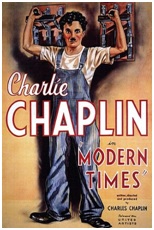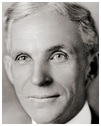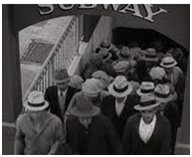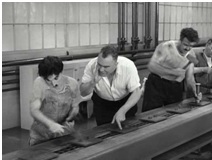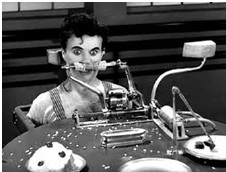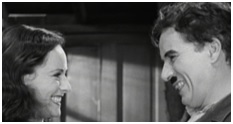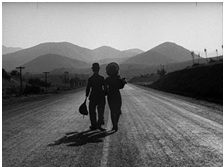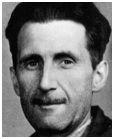|
 |
|
 |
Modern Times - Management, Mass Production and
Motivation
Modern Times (1936)
Famous for...
Set in... America during the Great Depression of the 1930’s.
Director Charlie Chaplin. Oscars None.
Key characters The Tramp (Charlie Chaplin),a poor worker with the famous cane, baggy trousers and tight coat (pictured right in another of Chaplin's films,City Lights). Young girl (Paulette Goddard, Chaplin’s second wife and also the star of his film about Hitler, The Great Dictator).
The story Compared to a flock of sheep (pictured right), workers push out of a subway station to get to their work in the Electro Steel Corporation’s factory. After doing a jig-saw, reading a paper and being served by his secretary, the company’s boss:
One worker is the Tramp whose job is to tighten bolts (with both hands) onto steel plates, brought to him on a conveyor belt assembly line (pictured right below). His supervisor:
When he itches, gestures, or brushes away a troublesome fly, he:
Whilst sneaking a cigarette in the toilet, he is spied on by the boss on his TV screen who tells him to go back to work. During lunch the Tramp automatically starts his bolt tightening movements, which:
In his office the boss is shown a mechanical feeding machine for workers to eliminate the lunch hour and so increase production (pictured right). The Tramp is chosen to try out the new machine, but it’s useless, going haywire and making the food inedible. He goes back to work and the line is put on top speed. The Tramp:
He leaves the hospital, recovered from his nervous breakdown but jobless. Like lots of others, he can’t get a
job because of the Great Depression. He is arrested by the police who mistake him for a communist, when he waves a red warning flag in the street. Meanwhile a poor motherless young girl steals a case of bananas from a ship (pictured right), sharing them with:
In prison the Tramp (bolstered by some cocaine accidentally eaten with his lunch) stops a jailbreak which leads to his release. The young girl’s sisters are taken away into care, when her father is killed in a riot by the unemployed. But
she escapes, and the Tramp sinks a half-finished ship in a brief shipbuilding job. The girl (pictured right) is arrested after stealing some bread (despite the Tramp trying to take the blame for it) . He is arrested, too, when he can’t pay for a meal. They:
The Tramp is inspired to make this dream come true. He:
On his release, the overjoyed girl tells him that she has found a home for them. Even though it’s a lakeside delapidated shack, they are thrilled with it, because it's their first home (pictured right above). He gets a factory job as assistant to a machinery mechanic who gets caught in the cogs of a huge machine . After feeding him lunch, the Tramp loses his job, when the workers go on strike. He is again put in jail, when he accidentally hits a policeman. Meanwhile the girl:
He is a disaster as a waiter but very successful as a singer. He then escapes with the girl when child care officials try to take her. They are finally seen walking optimistically into the sunrise arm in arm (pictured right).
Lessons for management, motivation and mass production
1. Mass production murders minds The assembly line turns the Tramp into a dehumanized, automated machine. He gets a nervous breakdown from the:
2. Control is costly Chaplin used the term “Big Brother” (13 years before George Orwell, pictured
right below, did in his book, 1984) to describe how the boss spies on his workers
to make sure they:
This close supervision destroys workers’:
So they go on strike or (like the Tramp) leave.
3. Follow your dreams The Tramp is determined to work hard, so that he and the girl can have a better life.
4. The human spirit has huge potential The Tramp and the girl overcome all their difficulties (ill health, poverty, unemployment and her dead parents)
to face the future with:
At the end of the film, the girl is at the point of giving up, when the Tramp tells her: “Buck up - never say die. We’ll get along!”
5. Injustice infuriates In his plush office, the boss reads comic strips, while his workers slave away on the assembly line, bullied by their supervisors. The workers’ unjust and bad treatment leads to the strike which the police wrongly believe is caused by communist agitators.
6. Co-operation is crucial Workers on an assembly line must work well together, because a mistake by one person leads to problems for people further down the line (as the Tramp shows).
7. Machinery isn’t always marvellous The mechanical feeding machine for workers:
The mechanic gets trapped in the cogs of a huge machine, symbolizing the potential threat of technology. 8. Kindness is cool The girl and the Tramp help each other, and he gives food to the burglars in the department store.
Two film websites to recommend 1. filmsite.org (run by Tim Dirks). 2. aveleyman.com (run by Tony Sullivan) |
|
|
||
|
|
|
||
|
||
| Copyright © wisdomtowin.com All Rights Reserved | ||
|

